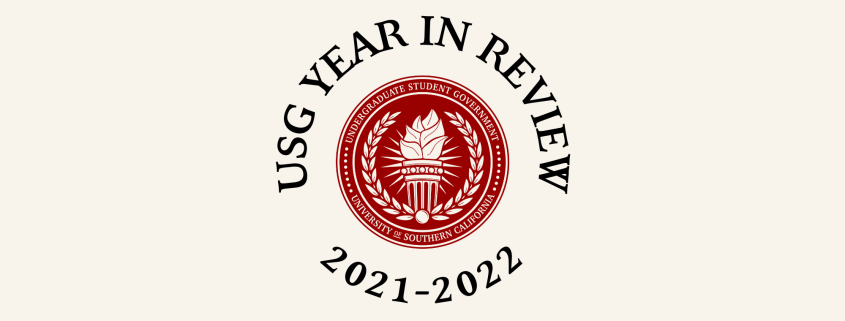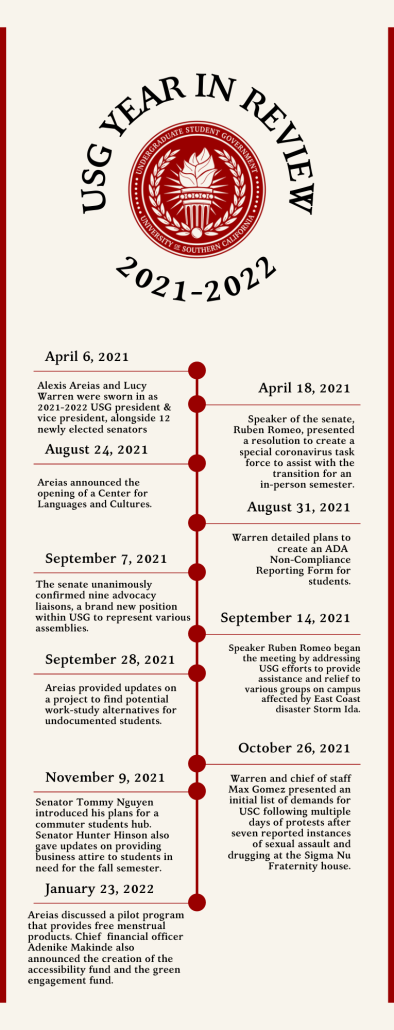Year in Review: USG president and vice president reflect on accessibility and Sigma Nu protests
After a year, Alexis Areias and Lucy Warren’s terms as Undergraduate Student Government president and vice president are coming to an end.
During their campaign, the duo ran on a platform based on rebuilding trust between USG and the general student body and tackling financial barriers and accessibility issues. Some of the progress Areias and Warren made, in collaboration with the senate, included projects around accessibility, survivor support, free menstrual products and Department of Public Safety budget transparency, picking up pace from their previous work as USG senator and chief diversity officer respectively.
In an interview with the Daily Trojan, Areias highlighted the difficult transition of starting her former position as senator while dealing with the logistical setbacks of the impeachment of former USG president Truman Fritz and the resignation of former vice president Rose Ritch in 2020. It’s that time of uncertainty and precarity that motivated the team to run for the presidential platform, where they carried over their most cherished senate project into their presidency: free menstruation products.
“[The free menstrual products] started as a pilot program when I was in the senate, and now that we are president and vice president, it’s something that we’ve been able to see through to fruition,” Areias said. “So, starting this next year, pretty much every single building, every single bathroom will have free menstrual products for use.”
Though the free menstrual products and the creation of the Student Health Advisory Committee, which represents the student body for USC Student Health, were accomplishments for Areias, she points out the term was marked by the seven reported instances of sexual assault and drugging — six at the Sigma Nu Fraternity house and one at an undisclosed location.
It’s this event that also defined Warren’s time in office.
Warren, in an interview with the Daily Trojan, said she remembers joining the protest held by the Student Coalition Against Sexual Violence, where the group collectively marched down to the row in protest of the University’s failure to prevent sexual violence against women and provide support for survivors on campus following multiple days of protests after the sexual assault reports.
“Being part of what was going on those weeks, and trying to quickly come up with solutions with the coalition, and to advocate for students during that time, that was a whirlwind,” Warren said. “It was incredibly, incredibly rewarding to be doing that kind of work in such a heightened time when it felt like we were actually at a tipping point where we could make significant progress.”
In the days following the assaults, Warren, working with chief of staff Max Gomez, presented an initial list of demands for USC, which included removing the members and Interfraternity Council chapters involved in incidents of sexual assault and drugging, implementing reforms and University oversight for Greek life spaces, provided drug testing strips to students and overhauled the systems available for students to report sexual assaults and crimes. The next day, USG released a student-wide statement of support for survivors via a communitywide email Oct. 27.
Warren said that one of her goals from the start was to make Title IX more accessible to the student body and streamline support for survivors. USG expanded bystander intervention training programs across campus through its funding department and made progress in creating a centralized reporting system.
Another prominent part of their term was accessibility, Warren said.
“I hadn’t heard disability being talked about in USG,” Warren said. “To make the campus more accessible was my personal motivation. I think in the last year, we’ve done more in accessibility than has been done in USG in the past.”
Under the Areias-Warren administration, USG created accessibility funds, which will help with accessibility training and increase program accessibility for students from registered student organizations, and created an ADA Non-Compliance Reporting Form for students.
Additionally, Warren said USG pushed for online hybrid learning at “every admin meeting” that they attended over the summer and led an “Absence Notification Project” to alleviate the pressure on students as they adjusted to in-person classes amid the coronavirus pandemic.
“We have a long way to go in making campus more accessible, but we’re just getting started, and I feel like we’ve laid good groundwork for future years to come in and make accessibility a priority,” Warren said.
Areias worked to spearhead this accessibility through other initiatives, including by leading a search for workstudy alternatives for undocumented students who often don’t have access to workstudy due to the absence of federal funding. She also collaborated on the project with external committee chair Sydney Brown and IDEAS — Improving Dreams, Education, Access, and Success — a cultural assembly focused on providing resources for undocumented students. This collaboration echoed Areias and Warren’s campaign goals: to prioritize inclusivity.
“There is a lot of work that’s going on on this campus and advocacy that doesn’t just happen within USG,” Areias said. “[We’ve been] making that extra effort to include groups that haven’t been historically represented within our Undergraduate Student Government, and ensuring that, instead of siloing that work, that we’re really bringing in that advocacy and working to help promote that.”
This cultural representation was reflected in the confirmation of nine new advocacy liaisons in September. The members are part of the new advocacy initiative within the organization, which heads different projects from their respective cultural assemblies with USG.
“There are so many things that we didn’t get done, and I think that’s what is hard when you’re in this position is because you just want to work on everything and do everything. There are still so many things in so many areas that we leave untouched. I think it’s exciting for whoever comes in next because you hope that they do even more than you ever could.”
Lucy Warren, 2021-22 Undergraduate Student Government vice president
Another collaborative initiative that Warren and Brown worked on in collaboration with USG was DPS Budget Transparency, where they managed several projects pertaining to the issue. Warren said they worked in favor of “counselors, not cops,” and unveiled a collaboration with the Black Student Assembly to support Kayla Love, a graduate student studying chemistry, who was involved in a dispute with the Los Angeles Police Department and USC Los Angeles County Medical Center.
“I think we’re going to see a lot of progress when it comes to the DPS budget being transparent,” Warren said. “I’ve been able to sit on the selection committee for the new DPS chief, and I think we’re going to see very exciting changes once we get a new chief later this year.”
Warren said her time as vice president has taught her how to prioritize and have balance in everything she does.
“There are so many things that we didn’t get done, and I think that’s what is hard when you’re in this position is because you just want to work on everything and do everything,” Warren said. “There are still so many things in so many areas that we leave untouched. I think it’s exciting for whoever comes in next because you hope that they do even more than you ever could.”
Areias also touched on the bureaucratic struggles of not having every project easily flow through the organization.
“There are certain things … that you come into this office expecting to be straightforward,” Areias said. “‘Why would there be any opposition to this? This is a great thing. This is something that will serve the student body,’ and you quickly realize that that’s not always the case.”
Areias used that time to learn how to prioritize projects and also how to aggressively advocate to the right people.
Referring to their term as “bittersweet,” Warren said she hopes the next generation of USG will prioritize inclusivity and make the most of their time in office.
“I was so thrilled to have that opportunity to be part of a larger voice when it comes to advocating with administrators for improvements around campus,” Warren said. “I hope that people feel that energy going forward and that it’s something that’s long-lasting when it comes to just knowing how much there is to really tackle here.”


